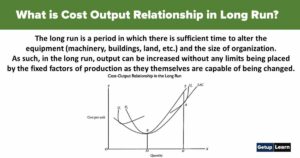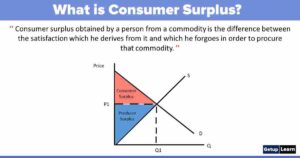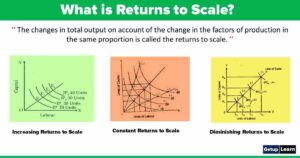Table of Contents
- 1 What is Law of Diminishing Marginal Utility?
- 2 Definition of Law of Diminishing Marginal Utility
- 3 Explanation of the Law of Diminishing Marginal Utility
- 4 Causes of Law of Diminishing Marginal Utility
-
5 Assumptions of Law of Diminishing Marginal Utility
- 5.1 All Units of the Commodity should be Homogenous
- 5.2 Appropriate Quantity of Consumption
- 5.3 Continuity in Consumption
- 5.4 No Change in the Mental State of Consumer
- 5.5 Income, Habit, Taste and Preference of the Consumer do not Change
- 5.6 Price of the Commodity and Its Related goods Remain Constant
- 5.7 Want should be a Single One
- 5.8 Applies to Pleasure Economy Only
- 6 Exceptions of Law of Diminishing Marginal Utility
- 7 Criticism of Law of Diminishing Marginal Utility
- 8 FAQ
What is Law of Diminishing Marginal Utility?
This law is an important and fundamental law of economics that was first scientifically explained by Gossen, later on, it was developed by Marshall. The Law of Diminishing Marginal Utility is based on the assumption that as a consumer consumes more and more units of a commodity, its severity of want declines, due to this, the marginal utility derived from the commodity also declines.
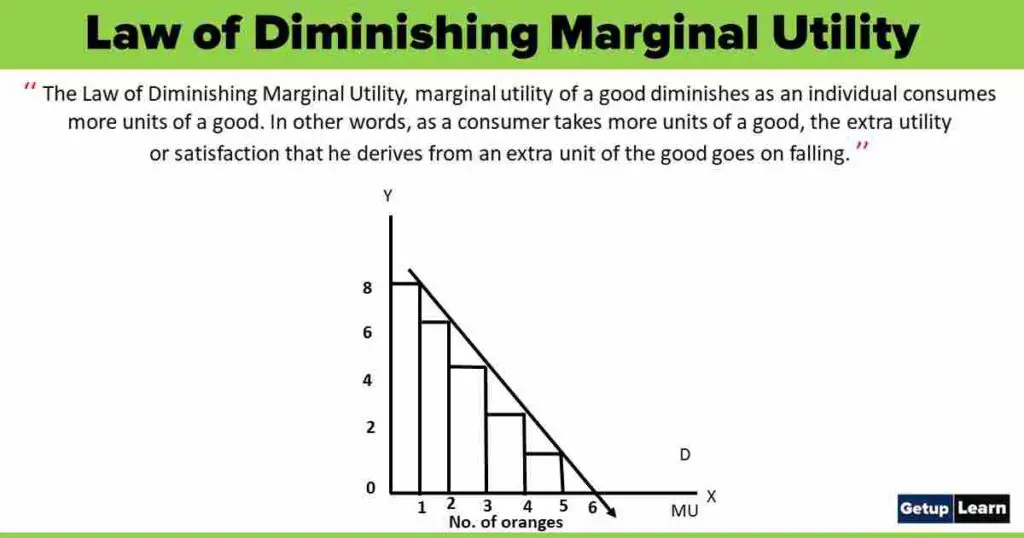
Table of Contents
Definition of Law of Diminishing Marginal Utility
[su_quote cite=”Marshall”]The additional benefit which a person derives from a given increase of his stock of a thing diminishes with every increase in the stock that he already has. In short, when a consumer for the satisfaction of his want consumes continuously units of a commodity, the utility which he derives from the successive units goes on declining. This tendency in economics is known as the law of diminishing marginal utility.[/su_quote]
Explanation of the Law of Diminishing Marginal Utility
The law can be explained with the example that Mr Ram consumes additional units of orange and the utility he derives as given in the following table:
Marginal Utility
| Units of Apple | Marginal Utility (MU) |
| 1 | 8 |
| 2 | 6 |
| 3 | 4 |
| 4 | 2 |
| 5 | 0 |
| 6 | -2 |
Table 2 reveals that the utility derived by consumers from additional units of oranges decreases. The marginal utility from different units is 8, 6, 4 and so on. The marginal utility from the 5th unit of apple is zero and thereafter it is negative. On the basis of table 2 we can represent MU diagrammatically as given below:
In the diagram number of oranges is shown on OX-axis and marginal utility on the OY-axis. MU shows the decreasing trends of all the units of oranges. The 5th unit of orange gives zero (0) MU while the 6th unit gives negative marginal utility. A is the point of satiety thereafter consumers should not consume additional units of oranges. There are three stages of marginal utility as given below:
- MU shows a decreasing trend up to the 4th unit of orange but it is positive.
- MU is zero from the 5th unit of oranges it is the satiety point. The consumer should not consume after this point.
- MU becomes negative with the consumption of the 6th unit of oranges.
Causes of Law of Diminishing Marginal Utility
Let’s look at these causes of law of diminishing marginal utility:
- Satiety of a Want
- Intensity of Want Declines
- No Perfect Substitutes of Goods
- Nature of Human Behavior
- Variety of Uses
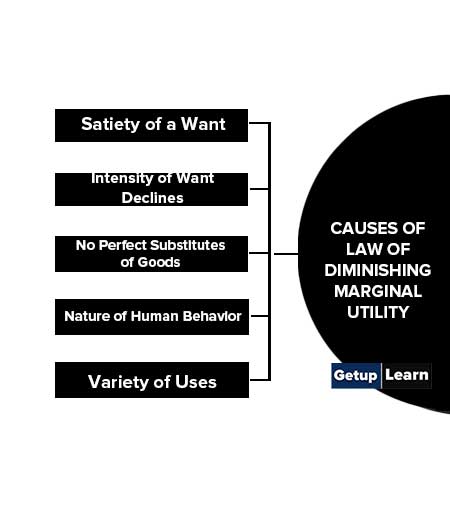
Satiety of a Want
As we know that human wants are unlimited and the resources are scarce with alternative uses. A particular want can be satisfied at a particular point in time. When a consumer consumes different units of a commodity on a continuous basis, the additional utility derived by him goes on declining and thereafter he gets zero and even negative utility.
When he gets zero utility it means a saturation point has been reached and after that point, he would not like to consume an additional unit of that commodity. Hence, the law of diminishing utility will operate.
Intensity of Want Declines
The utility of a commodity depends not only on the want satisfying power but also on the intensity of the want. As a consumer goes on consuming additional units of a commodity the intensity of the want goes down and consequently the subsequent utility goes on declining.
No Perfect Substitutes of Goods
As we know that there are substitute goods but they can be substituted to some extent only and there is no perfect substitute for goods. For example, bread and butter are consumed in a ratio and any imbalance in the ratio of the two will give diminishing marginal utility to the consumer.
Nature of Human Behavior
It is the nature of human behaviour that a consumer will consume more of those goods that he has not consumed and less of those goods he has already consumed. Therefore, the nature of human behaviour is also the cause of operating the law.
Variety of Uses
There are several commodities having a variety of uses or alternative uses in our daily life. The use of a commodity depends on the basis of priority for a particular use. For example, the use of electricity depends upon the priority of particular use.
As we move from a more important use of a commodity to a less important use of it, the marginal utility of that commodity will decline.
Assumptions of Law of Diminishing Marginal Utility
The law of diminishing marginal utility operates only when other things remain the same. Following assumptions of law of diminishing marginal utility:
- All Units of the Commodity should be Homogenous
- Appropriate Quantity of Consumption
- Continuity in Consumption
- No Change in the Mental State of Consumer
- Income, Habit, Taste and Preference of the Consumer do not Change
- Price of the Commodity and Its Related goods Remain Constant
- Want should be a Single One
- Applies to Pleasure Economy Only
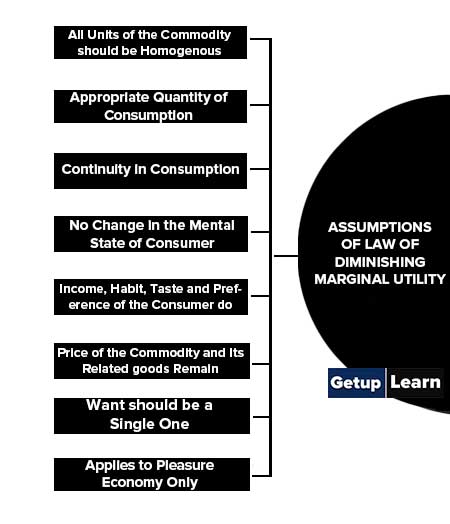
All Units of the Commodity should be Homogenous
The law will operate only when all the units of the commodity consumed by the consumer are homogenous or identical in quality and quantity. For example, Mr Ram is consuming various units of orange. All the units of orange should be identical in quality and quantity.
If one unit is sour, another is small in size and sweet then the second unit will give more utility than the first unit of orange. Hence, the law will operate when all the units of the commodity are homogeneous.
Appropriate Quantity of Consumption
The units of the commodity consumed by a consumer should be appropriate in quantity. In other words, the units should neither be very small nor large in size. For example, a consumer is given drops of water instead of a glass of water when he is thirsty. The additional drops of water will give him more utility and the law will not operate.
Continuity in Consumption
The law will operate when the consumption of various units of a commodity is being consumed continuously. If there is a time gap between the consumption of units of the commodity the additional utility derived by the consumer will increase. For example, if a consumer consumes one piece of bread in the morning and another piece of bread at noon the law will not operate because there is no continuous consumption of bread.
No Change in the Mental State of Consumer
The law of diminishing marginal utility will operate when the mental state of the consumer does not change. For example, a consumer has taken wine the utility he is deriving from additional units of chapati will increase because it will increase his hunger.
Income, Habit, Taste and Preference of the Consumer do not Change
The law will operate when the income, habit, taste and preference of the consumer do not go under change while consuming the different units of a commodity. If these variables change the additional units of the commodity will give more utility.
The law will operate when the price of the commodity under consumption and its related goods (substitutes and complementary goods) do not change. If there is any change in the price of either the commodity or its related goods the marginal utility of additional units will increase and the law will not operate.
Want should be a Single One
The law will operate only when the consumption of various units of a commodity is done for satisfying a single want. If the consumption is carried on for the satisfaction of multiple wants the law does not operate.
Applies to Pleasure Economy Only
The law will apply in the case of consumption which gives pleasure to the consumer. In a painful economy, the law will not operate because of the pains a consumer is realising on account of the non-availability of a commodity. For example, during drought fodder for animals is extremely needed and in that case, the utility will increase.
Exceptions of Law of Diminishing Marginal Utility
The law of diminishing marginal utility operates only when other things remain the same as pointed out by Prof. Alfred Marshall. However, there are some exceptions to the law as given below:
- Consumption of Very Small Units of the Commodity
- Rare Commodities, Monuments and Antiques
- Classical Music, Rhymes Poems etc.
- Wine & Harmful Goods
- Increase in the Number of Users or Consumers
- Personal Hobbies
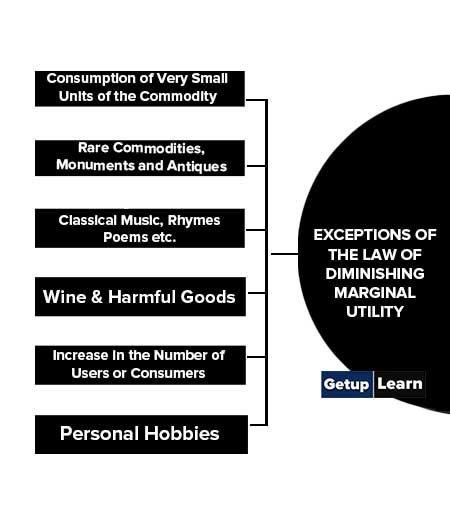
Consumption of Very Small Units of the Commodity
The law of diminishing marginal utility does not hold good when the units of consumption of the commodity are very small in size and quantity. For example, if a thirsty person is given water in small drops in place of glass water the law does not operate.
Rare Commodities, Monuments and Antiques
The law is not applicable in those cases where people collect rare commodities monuments, antiques, old coins, documents, stamps etc. For those things which are collected as s hobby the marginal utility will increase instead of a decline in it.
Classical Music, Rhymes Poems etc.
The law does not apply in the case of classical music, rhymes, poems etc. The audience will enjoy more by listening to such music, rhymes and poems and the law will not operate.
Wine & Harmful Goods
The law does not apply to alcoholic drinks. A drunkard takes additional pegs of wine and his satisfaction goes on increasing. Hence the marginal utility from additional pegs will increase.
Increase in the Number of Users or Consumers
The law will not apply to those goods and services whose consumers, or users number is increasing. For example, the number of telephone connections is increasing day by day and the utility is increasing instead of decreasing in practical life.
Personal Hobbies
The law does not apply to personal hobbies. For example, people have hobbies collecting old coins, old photos, old stamps and seashells. In such cases, an additional collection of these things will give them more satisfaction and the law will pot operate.
The above exceptions to the law are imaginary. As we find that ultimately the law of diminishing marginal utility will operate as a consumer goes on consuming additional units of a commodity. The law is the fundamental law of consumer behaviour which is universally applicable. Several economic laws are based on it.
Criticism of Law of Diminishing Marginal Utility
Although the law of diminishing marginal utility is a universal law of consumer behaviour the law has been criticised on the following grounds:
- Utility is Not Measurable
- Marginal Utility of Money Does not Remain Constant
- Based on Subjectivity
- Ignores Macro Analysis
- Ignores Other Effects
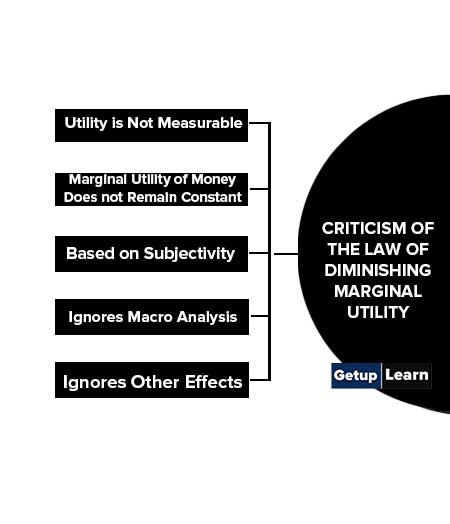
Utility is Not Measurable
The law is based on the cardinal measurement of utility. As we know the concept of utility is a psychological concept that cannot be measured. At the same time, the measuring rod of utility is money which is not an exact and stable measurement as we find in the case of natural and physical sciences.
Marginal Utility of Money Does not Remain Constant
In actual life, we find that the major part of income is spent and a minor part of income remains with the consumer. He will spend the remaining part of his income rationally and naturally, the marginal utility of money will increase. The exchange value of money increases with the increase in its demand.
Based on Subjectivity
The utility of a commodity is based on the nature of a consumer. It is related to the subjectivity of the consumer. The subjectivity of a consumer is also affected by several factors like time, country, taste, fashion and environment.
Ignores Macro Analysis
The law is related to the microanalysis which deals with the individuals while in recent years the scope and importance of macroeconomic analysis are also gain ground and without it, the study of economic analysis will not be correct and complete.
Ignores Other Effects
The study of the law takes into consideration the increase in the consumption of a commodity only while in real life we see that there are several factors affecting the utility of a commodity. For example, prices and quantum of related goods (substitutes and complementary) also affect the utility of a commodity, such effects have been ignored by the law.
FAQ
Who has given the law of diminishing marginal utility?
Menger also developed the law of diminishing marginal utility.
What is the concept of marginal utility?
The additional benefit which a person derives from a given increase of his stock of a thing diminishes with every increase in the stock that he already has. In short, when a consumer for the satisfaction of his want consumes continuously units of a commodity, the utility which he derives from the successive units goes on declining. This tendency in economics is known as the law of diminishing marginal utility
Which are the assumptions of law of diminishing marginal utility?
Following assumptions of the law of diminishing marginal utility:
1. All Units of the Commodity should be Homogenous.
2. Appropriate Quantity of Consumption.
3. Continuity in Consumption.
4. No Change in the Mental State of Consumer.
5. Income, Habit, Taste and Preference of the Consumer do not Change.
6. Price of the Commodity and Its Related goods Remain Constant.
7. Want should be a Single One.
8. Applies to Pleasure Economy Only.
What are the criticisms of law of diminishing marginal utility?
Although the law of diminishing marginal utility is a universal law of consumer behaviour the law has been criticised on the following grounds:
1. Utility is Not Measurable
2. Marginal Utility of Money Does not Remain Constant
3. Based on Subjectivity
4. Ignores Macro Analysis
5. Ignores Other Effects



